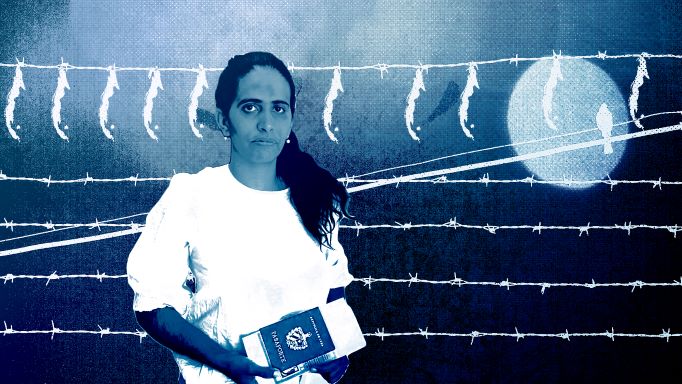By now it is clear that the banishment to which the Cuban regime has subjected activist Anamely Ramos constitutes a violation of her right to free movement, enshrined in the Cuban Constitution and the Universal Declaration of Human Rights. But is this the only right of which the activist has been deprived? What other implications does the fact that the regime has prevented her from entering her country of birth and residence have?
The first is that Ramos loses the few political rights that exist in Cuba. She will not be able to aspire to be nominated for a representative position at the constituency level, since one of the requirements established by Cuban Electoral Law is to have resided in the country for the last two years consecutively and to show a willingness to remain; though, had she complied with this requirement, State Security would likely go about preventing her from being able to stand for any office, judging by what occurred with independent candidates in 2017. Now, however, as she cannot enter or reside in Cuba, she definitely cannot vote in municipal and national elections, referendums and plebiscites.
When Ramos has been away from Cuba for two years, she will have lost her residency, pursuant to the Migration Law, as amended by Decree 305 of October 2012. If after this time she decides to try to enter the country again she will have to complete a costly process of updating or applying for a passport. The Immigration Law, as amended by Decree 305 of October 2012, states that citizens of the island, even if they have a second citizenship, may only enter the country with a passport issued by the Cuban State.
According to current regulations of the Ministry of Finance and Prices, the application for a passport may cost about 234 USD. Paying this amount does not guarantee one acquisition of the travel document, which may be denied, without any refund.
If Ramos were fortunate and the regime allowed her to enter Cuba, this does not mean that she would be able to reside in her country again. To do so she would have to apply for repatriation, which also entails the disbursement of an amount of money that would not be returned to her if her application were rejected.
Anamely Ramos also loses the capacity to establish, modify or terminate civil legal relations, such that she is obliged to turn to a resident in Cuba to represent her in matters related to personal property, real estate, contracting or inheritances.
For this she would need to sign over a power of attorney to that individual, which also means a significant outlay of money. And she would have to hurry, because this representation through a third party can only be established before one has been outside national territory for 24 months, and only if one has a valid Cuban passport.
Among the civil rights that exiled Cubans lose for expressing open criticism of the regime are those of transferring or withdrawing funds from savings accounts or other valuable assets deposited at national banking agencies, which, inexorably, require the customer’s physical presence and a valid national identity document.
Nor can one maintain ownership of any immoveable assets, such as housing and land, whether acquired through legitimate legal acts of sale, donation, or inheritance, prior to exile.
Decree Law 288, amending the General Housing Law in Cuba, in force since October 2011, establishes in its Article 81.1. that "permanent residences, when the owner has definitively left the country, are confiscated by the State for the purpose of transferring ownership to the persons entitled thereto, in accordance with the provisions of this Law." Lands that are not exploited by an owner are also subject to expropriation.
Neither will they be able to receive inheritances, since Article 470 of the Cuban Civil Code states that "having definitively left the country is also a cause barring one from being an heir or legatee."
The Cuban regime, which boasts of protecting the rights of children and has dared to criticize U.S. government measures affecting Cuban families on both sides of the Florida Straits, by banishing citizens whose presence in the country its finds irksome, directly attacks families, the institution of marriage, and the right of children to be with their parents.
The Family Code currently in force establishes permanent departure from the country as grounds for the loss of parental authority, so that those exiled for political reasons could lose this right with respect to their offspring in judicial proceedings.
Although the draft of the Family Code eliminates leaving the country as a reason for being deprived of parental responsibility, in practice, banished parents are stripped of the right to participate in the upbringing of their children and to provide them with security, in addition to their rights and duties as spouses, as they are separated from their partners against their will.
At the same time, they are prevented from fulfilling their moral and legal duty to care for their ascendants, such as parents or grandparents, or even siblings who may suffer from an illness or have a physical or intellectual disability that renders them unable to care for themselves.

We need to move fast. Deadlines all over the place.